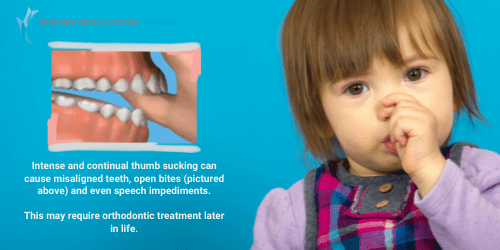Habits tend to start very early in life — in fact, 90% of newborn babies start sucking on their hands within two hours after birth!
Many parents worry about this habit and the effect it will have on the development of their baby’s teeth or the impact it will have later in life. The good news is that thumb sucking is very normal in babies and children and shouldn’t cause any permanent damage if it stops by the age of five.
Most children will stop sucking their thumbs between the ages of two and four. However, some children continue on with this habit and it’s important to curb it before their permanent teeth start to come in (normally around six years).
In this article, we’ll explore the thumbsucking effects as well as tips to help your child move on from this habit before it has an impact on their teeth.
What are the potential problems for teeth from sucking thumbs?

For the most part, there is no reason to be concerned about thumbsucking until your child’s front teeth start to break through the service of the gums. When this happens, some problems can occur including:
- Protruding teeth pictured above and/or bottom teeth tipping inward
- An overbite or underbite
- Misaligned teeth
- Speech impediments
- Changes to the shape of the jaw
- Sensitivity on the roof of the mouth
The determining factor is how aggressively your child sucks their thumbs and how long the habit lasts. Children who vigorously suck their thumbs and continue sucking their thumbs after their permanent teeth have come in will experience more thumbsucking effects than those who stop when they’re younger.
However, the negative effects of thumbsucking don’t end with their teeth. If your child is an aggressive thumbsucker, there is also the potential for sore thumbs, infections and calluses on their thumbs.
There are also lots of germs on our hands, so when your child sucks their thumb, they’re putting those germs directly into their mouth. This could cause your child to get sick more often than other children and can cause cracks or cuts in their hands to get infected.
If you’re concerned about the quality of your child’s teeth from sucking their thumbs, get in touch with your local dentist today. We can provide recommendations to help your child curb the habit or offer treatment options for misaligned teeth.
Are dummies better than thumbsucking?

Image: Pexels
There are some arguments about whether a dummy or “pacifier” is better for children than thumbsucking. There are a few advantages of using a dummy over thumbsucking — for example, dummies are often softer than thumbs and cause less damage to the teeth, dummies can be cleaned and the plastic rim around the mouth eases some of the tension from thumbsucking.
Plus, as an external object, dummies can be taken away to curb the habit. Eventually, they will stop relying on their dummy for self-soothing purposes.
While dummies are softer on the teeth and gums, it’s still important to move them away from sucking dummies and thumbs before their permanent teeth come in because both options can have an impact on their tooth development.
If your child keeps sucking their thumb or a dummy after their permanent teeth have come in, there’s a chance they will need corrective treatment to fix any misalignments or bite problems. X-rays and regular examinations of your child’s mouth will help determine the best treatment plan.
Quite often, braces are recommended to correct misalignments and jaw problems. In some cases, children might need early orthodontic treatment using appliances like expanders.
How to prevent your child from sucking their thumbs

Image: Pexels
Most kids will grow out of sucking their thumbs on their own. However, some children need a little help to break the habit. Below, we have a few tips on how to help them quit:
- Find out why they’re sucking their thumbs. Sometimes children suck their thumbs because they’re hungry, anxious, tired or even just bored! Take note of potential triggers and the time of day when they start sucking their thumbs. You might be able to keep them distracted or regulate their schedule to reduce thumbsucking.
- Offer praise and reminders. Try not to get frustrated when you see your child sucking their thumbs. Instead, give them gentle reminders when they start sucking their thumbs and praise them for stopping. Most of the time, they probably don’t even notice they’re doing it.
- Create a rewards system. Children respond better to positive reinforcement. Help them set attainable goals like avoiding sucking their thumb at bedtime or while watching TV. If they reach these goals, they’ll gain a sense of accomplishment and control — consider making a sticker chart or calendar so they can see their progress as it happens.
- Keep them busy. As we said before, some children suck their thumbs because they’re bored. Distraction is a powerful tactic for thumbsucking — hands-on activities like colouring, painting, doing puzzles and playing outside will keep them busy and keep their thumbs out of their mouth!
Most importantly, be sure to include your child in the process rather than getting frustrated or simply taking away their dummy. Explain why they should stop sucking their thumb — if your child is more involved in the plan to quit, they will be more accepting and willing to stop sucking their thumb.
And remember, sucking on a thumb or dummy is a self-soothing activity. There might be some tears and temper tantrums but it’ll all be worth it in the long run.
Talk to your dentist about thumbsucking effects and how to prevent them today
If you’re really struggling to help your child curb the thumbsucking habit, it might be worth talking to your local dentist. They will have helpful recommendations and advice or even potential treatment options to discourage your child from sucking their thumbs.
At Swansea Dental Practice, we have extensive experience with children’s dentistry and orthodontics, and we’re fully equipped with mini-sized instruments and handpieces that are more comfortable for small mouths. We can examine your child’s teeth, gums and jaw, then determine if any treatment is needed to correct their smile.
We can also help come up with a plan to help your child stop sucking their thumbs for good, preventing the need for any treatment in future!
Get in touch to book an appointment with our dentists today.
Feature Image: Romper

